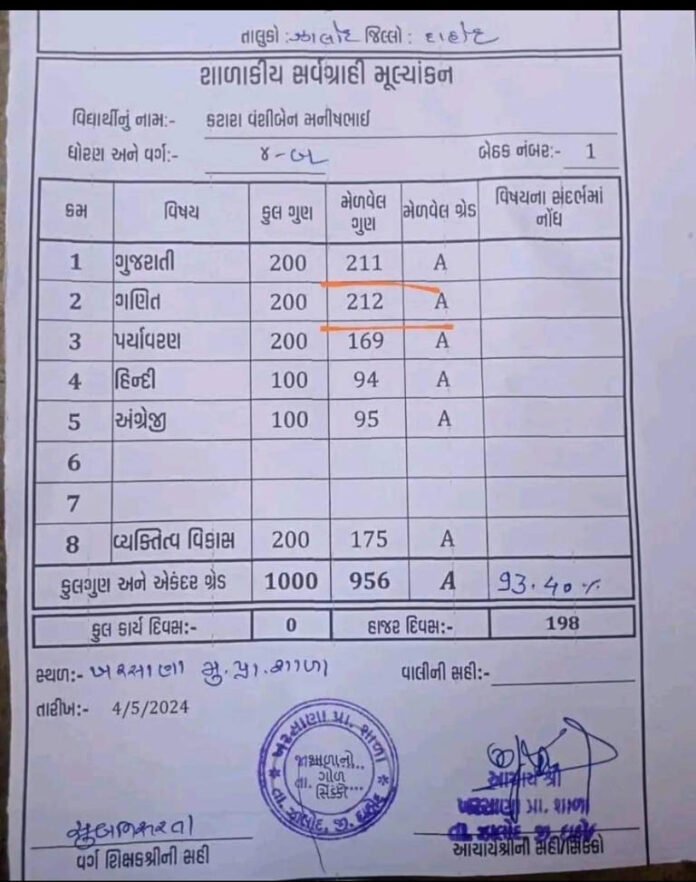In the realm of academics, exceptional performances often garner praise and recognition. However, when boundaries are pushed beyond the conceivable limits, scrutiny and investigation become inevitable. Such is the case of a primary school student in Gujarat, whose astonishing feat of scoring 212 out of 200 in an examination has sparked widespread attention and prompted an investigation into the integrity of the assessment process.
The incident, which unfolded in a primary school in Gujarat, caught the attention of educators, authorities, and the public alike. The student’s seemingly impossible achievement raised eyebrows and fueled speculation regarding the accuracy and fairness of the examination system. While academic excellence is commendable, the discrepancy between the maximum achievable score and the actual result has raised concerns about potential malpractice or errors in evaluation.
The primary examination, intended to assess students’ comprehension and mastery of fundamental subjects, serves as a crucial benchmark in their academic journey. It is designed to evaluate their grasp of concepts, problem-solving abilities, and overall academic proficiency. However, the revelation of a student scoring well beyond the designated maximum score has cast doubt on the credibility and reliability of the assessment process.
The unprecedented nature of the student’s achievement has prompted authorities to launch a thorough investigation into the matter. The objective is to unravel the circumstances surrounding the inflated score and ascertain whether it is a result of genuine academic prowess or procedural irregularities. Key stakeholders, including educators, administrators, and examination authorities, are actively engaged in the inquiry to ensure transparency and accountability.
At the heart of the investigation lies the integrity of the education system and its commitment to fostering genuine learning and merit-based evaluation. While exceptional performances are not unheard of, they must be grounded in authenticity and earned through diligent effort and aptitude. Any deviation from this principle undermines the credibility of the education system and diminishes the value of academic achievements.
The case underscores the need for stringent quality assurance mechanisms and robust oversight in the realm of education. It highlights the importance of standardized procedures, meticulous evaluation, and adherence to ethical principles to uphold the sanctity of academic assessments. Moreover, it serves as a reminder of the responsibility borne by educators and administrators in ensuring fairness and impartiality in the evaluation process.
As the investigation unfolds, it is essential to approach the matter with diligence, objectivity, and a commitment to uncovering the truth. While the student’s achievement has captured headlines and generated public interest, the focus should remain on the integrity of the examination system and the principles of academic honesty and fairness. Any lapses or irregularities must be addressed promptly and decisively to uphold the credibility of the education system and safeguard the interests of students.
In the broader context, the incident in Gujarat serves as a cautionary tale for educational institutions and policymakers worldwide. It underscores the need for continuous vigilance and proactive measures to detect and deter academic misconduct and irregularities. By strengthening oversight mechanisms, implementing rigorous quality control measures, and fostering a culture of integrity and accountability, education systems can uphold their reputation and ensure that academic achievements are earned through genuine effort and merit.
Ultimately, the outcome of the investigation into the Gujarat student’s extraordinary performance will not only shed light on a specific case but also resonate as a broader reflection of the integrity and credibility of academic assessments. It is a reminder of the enduring importance of upholding ethical standards and ensuring that the pursuit of knowledge and excellence remains grounded in principles of honesty, fairness, and integrity.

